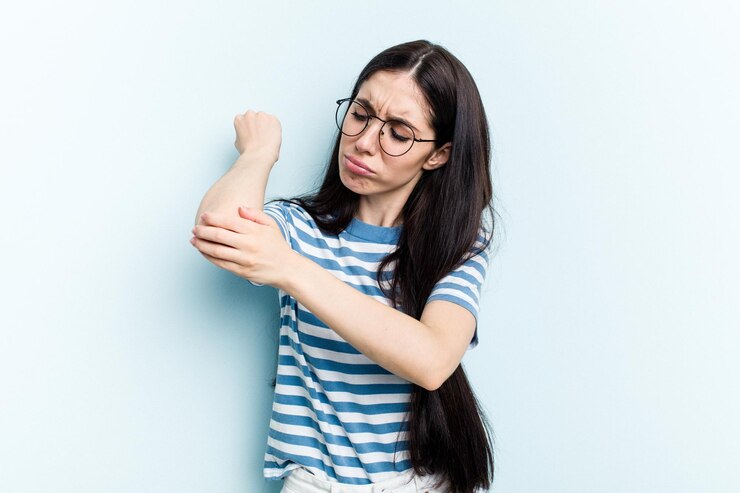
Arthritis, typically associated with ageing, is often overlooked as a health concern for young adults. However, it's essential to recognise that arthritis can strike at any age, including in your 20s. While less common, various forms of arthritis can affect young adults, impacting their quality of life and long-term joint health.
Table of Content:-
We asked our expert Dr Shrey Srivastav, General Physician - Sharda Hospital the same question and here is what he shared with us.
Types of Arthritis in Young Adults
1. Osteoarthritis (OA)
Traditionally viewed as a condition of the elderly, OA can also develop in young adults, particularly those who have experienced joint injuries. Injuries like a torn meniscus, often seen in athletes or those who engage in rigorous physical activities, can predispose individuals to OA at a younger age.
2. Gouty Arthritis
Characterised by sudden and severe pain in specific joints, such as the big toe or ankle, gouty arthritis can occur due to dietary factors like consuming foods high in purines, such as certain seafood and red meat. Additionally, obesity is a risk factor for developing gout.
3. Infectious Arthritis
Resulting from a bacterial, fungal, or viral infection that spreads to the joints, infectious arthritis can occur at any age. Post-infection arthritis may manifest after an individual has experienced an infection elsewhere in the body, such as the bladder, vagina, or gastrointestinal tract.

Also Read: Expert Shares the Power of Tulsi Leaves to Control Bad Cholesterol LDL Levels
4. Reactive Arthritis
This type of arthritis develops as a reaction to an infection elsewhere in the body, such as chlamydia or salmonella. It typically affects young adults and can lead to joint inflammation and pain.
5. Juvenile Arthritis (JA)
Afflicting individuals younger than 16, JA is an autoimmune disease where the body's immune system attacks healthy joints and tissues, leading to inflammation and joint damage.
6. Rheumatoid Arthritis (RA)
Another autoimmune disease, RA often begins in small joints like the fingers before progressing to larger joints such as the hips and knees. It can cause significant joint damage, leading to decreased mobility, deformities, and chronic pain.
7. Psoriatic Arthritis (PsA)
Linked with psoriasis, a skin condition characterised by red, itchy patches of skin and silvery scales, PsA can affect joints and lead to inflammation, pain, and stiffness.

Also Read: Combatting Measles: Expert Explains Symptoms and Effective Prevention Strategies
Risk Factors for Arthritis in Young Adults
Several factors can increase the risk of developing arthritis at a younger age:
1. Athleticism
Engaging in high-impact sports like football, hockey, rugby, or soccer can increase the risk of joint injuries, which in turn can predispose individuals to arthritis later in life.
2. Genetics
Family history plays a significant role in the development of arthritis. Individuals with a family history of arthritis are more likely to develop the condition themselves.
3. Joint Injuries
Trauma to the joints, such as ligament tears or fractures, can increase the risk of developing arthritis, especially if the injury is not adequately treated or rehabilitated.
4. Obesity
Excess weight puts additional stress on the joints, particularly weight-bearing joints like the knees and hips, increasing the risk of developing arthritis.
Also Read: Can Weight Loss Cause Chest Pain?
Recognising Arthritis Symptoms
While arthritis symptoms can vary depending on the type of arthritis and the affected joints, common symptoms in young adults may include:
- Difficulty moving joints
- Joint instability
- Pain or aching, especially after activity
- Popping or clicking sensations in the joints
- Stiffness after periods of inactivity
- Swelling around the joints
- Weakness in the muscles surrounding the joints
A Final Word
Arthritis is not exclusively an ailment of old age. Young adults can also be affected by various forms of arthritis, which can significantly impact their daily lives and long-term joint health. Recognising the risk factors and symptoms of arthritis is crucial for early detection and effective management. By maintaining a healthy lifestyle, including regular exercise, a balanced diet, and weight management, young adults can reduce their risk of developing arthritis and promote overall joint health and well-being.
Also watch this video
Read Next
Understanding Chest Heaviness at Night: Expert Explains Symptoms, Causes, and Preventive Measures
How we keep this article up to date:
We work with experts and keep a close eye on the latest in health and wellness. Whenever there is a new research or helpful information, we update our articles with accurate and useful advice.
Current Version